翻译技减词
- 格式:docx
- 大小:16.40 KB
- 文档页数:3
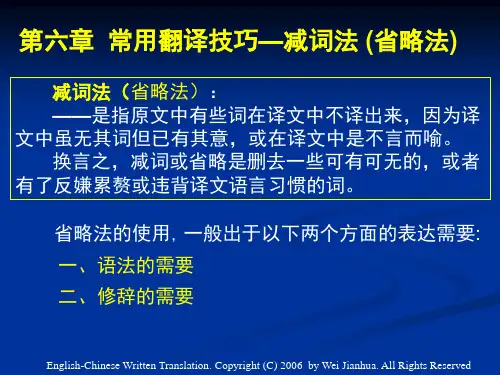
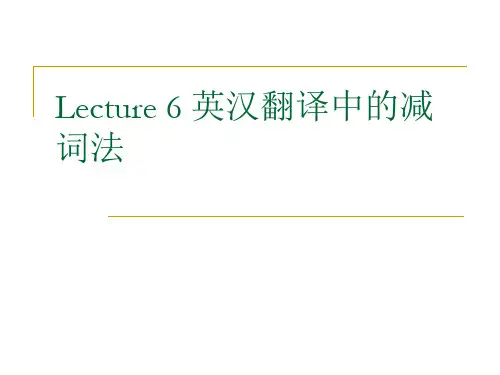
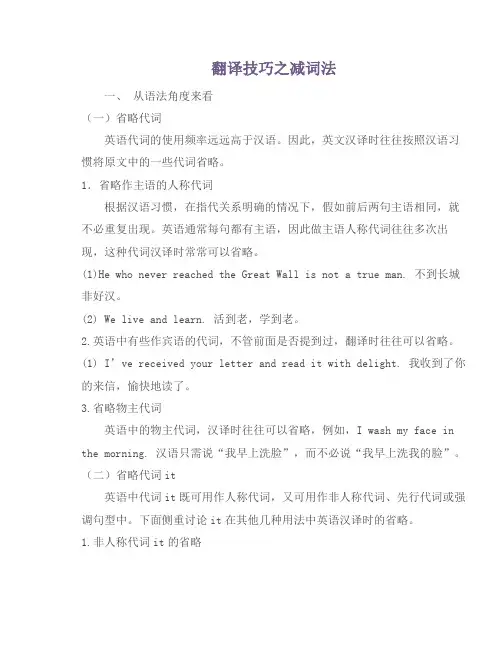
翻译技巧之减词法一、从语法角度来看(一)省略代词英语代词的使用频率远远高于汉语。
因此,英文汉译时往往按照汉语习惯将原文中的一些代词省略。
1.省略作主语的人称代词根据汉语习惯,在指代关系明确的情况下,假如前后两句主语相同,就不必重复出现。
英语通常每句都有主语,因此做主语人称代词往往多次出现,这种代词汉译时常常可以省略。
(1)He who never reached the Great Wall is not a true man. 不到长城非好汉。
(2) We live and learn. 活到老,学到老。
2.英语中有些作宾语的代词,不管前面是否提到过,翻译时往往可以省略。
(1) I’ve received your letter and read it with delight. 我收到了你的来信,愉快地读了。
3.省略物主代词英语中的物主代词,汉译时往往可以省略,例如,I wash my face in the morning. 汉语只需说“我早上洗脸”,而不必说“我早上洗我的脸”。
(二)省略代词it英语中代词it既可用作人称代词,又可用作非人称代词、先行代词或强调句型中。
下面侧重讨论it在其他几种用法中英语汉译时的省略。
1.非人称代词it的省略非人称代词it在句中做主语时实际上是个虚词,并不指代上下文中具体的事物,一般主要用于表示自然现象、时间、距离、环境及一般情况等。
汉译时,常将这一非人称代词it省略。
(1)It was just growing dark, as she shut the garden gate. 她关上园门时,已是暮色苍茫了。
(2) I glanced at my watch. It was earlier than I thought. 我看了一下手表,发现时间比我想象的要早。
2.先行代词it的省略先行代词it的主要作用是充当语法规则所要求的形式主语或形式宾语。
它本身也是个虚词,没有具体的词汇意义,因此汉译时往往可以省略。
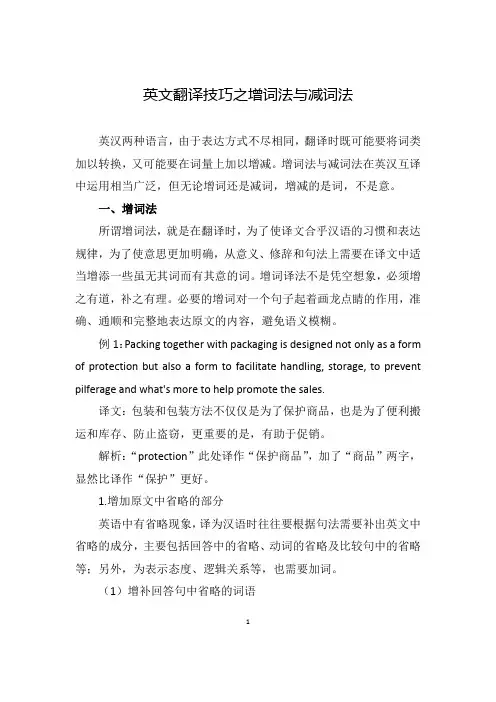
英文翻译技巧之增词法与减词法英汉两种语言,由于表达方式不尽相同,翻译时既可能要将词类加以转换,又可能要在词量上加以增减。
增词法与减词法在英汉互译中运用相当广泛,但无论增词还是减词,增减的是词,不是意。
一、增词法所谓增词法,就是在翻译时,为了使译文合乎汉语的习惯和表达规律,为了使意思更加明确,从意义、修辞和句法上需要在译文中适当增添一些虽无其词而有其意的词。
增词译法不是凭空想象,必须增之有道,补之有理。
必要的增词对一个句子起着画龙点睛的作用,准确、通顺和完整地表达原文的内容,避免语义模糊。
例1:Packing together with packaging is designed not only as a form of protection but also a form to facilitate handling, storage, to prevent pilferage and what's more to help promote the sales.译文:包装和包装方法不仅仅是为了保护商品,也是为了便利搬运和库存、防止盗窃,更重要的是,有助于促销。
解析:“protection”此处译作“保护商品”,加了“商品”两字,显然比译作“保护”更好。
1.增加原文中省略的部分英语中有省略现象,译为汉语时往往要根据句法需要补出英文中省略的成分,主要包括回答中的省略、动词的省略及比较句中的省略等;另外,为表示态度、逻辑关系等,也需要加词。
(1)增补回答句中省略的词语1例2:—He doesn’t know, does he?—Yes, he does.译文:——他不知道吧?——不,他知道。
例3:—Did you enjoy your time in Beijing?—Yes, I did.译文:——你在北京过得愉快吗?——是的,我过得很愉快。
(2)增补并列结构中省略的词语例4:On average, the economy performs less well in a president's second term than in his first.That pattern probably does not apply to Mr Obama. Since his first term was so difficult, the next, by rights, ought to be better.译文:一般来说,美国总统第二个任期内的经济不如第一任期。
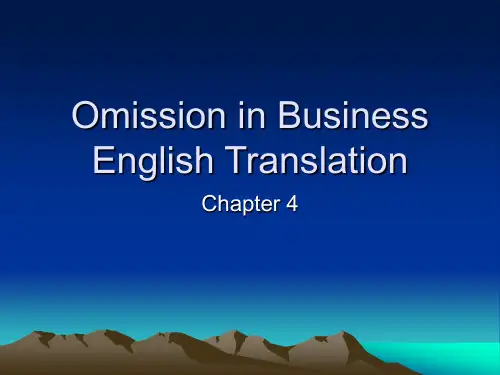
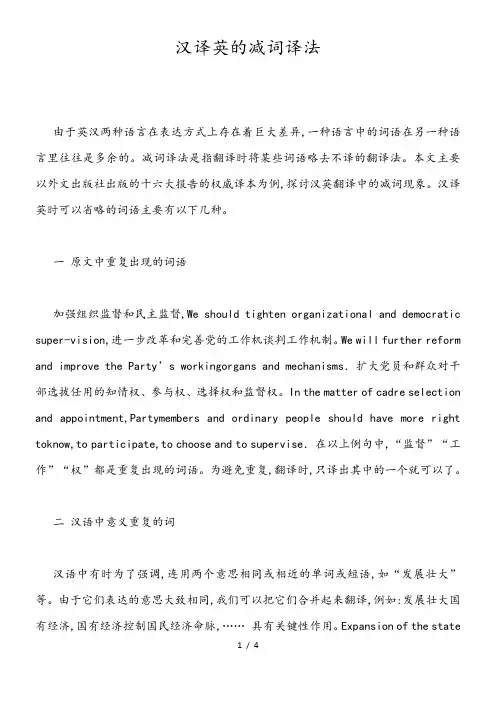
汉译英的减词译法由于英汉两种语言在表达方式上存在着巨大差异,一种语言中的词语在另一种语言里往往是多余的。
减词译法是指翻译时将某些词语略去不译的翻译法。
本文主要以外文出版社出版的十六大报告的权威译本为例,探讨汉英翻译中的减词现象。
汉译英时可以省略的词语主要有以下几种。
一原文中重复出现的词语加强组织监督和民主监督,We should tighten organizational and democratic super-vision,进一步改革和完善党的工作机谈判工作机制。
We will further reform and improve the Party’s workingorgans and mechanisms.扩大党员和群众对干部选拔任用的知情权、参与权、选择权和监督权。
In the matter of cadre selection and appointment,Partymembers and ordinary people should have more right toknow,to participate,to choose and to supervise.在以上例句中,“监督”“工作”“权”都是重复出现的词语。
为避免重复,翻译时,只译出其中的一个就可以了。
二汉语中意义重复的词汉语中有时为了强调,连用两个意思相同或相近的单词或短语,如“发展壮大”等。
由于它们表达的意思大致相同,我们可以把它们合并起来翻译,例如:发展壮大国有经济,国有经济控制国民经济命脉,…… 具有关键性作用。
Expansion of the statesector and its control of the life-line of the national economy is of crucial importance ...这样的例子在十六大报告的翻译中有很多,以下是更多的例句。
在竞争比较中取长补短。
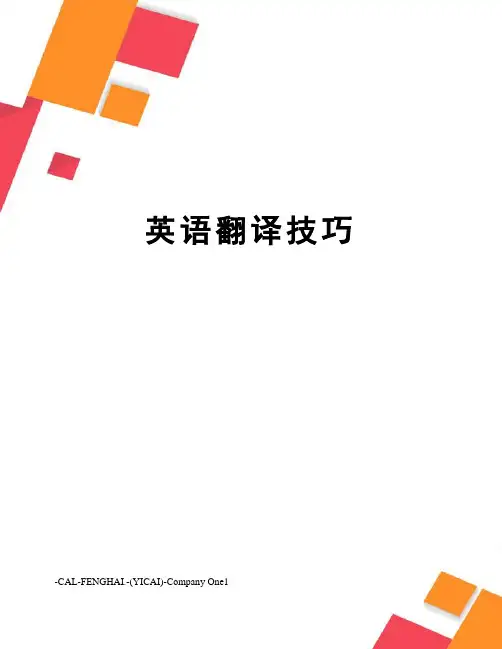
英语翻译技巧-CAL-FENGHAI.-(YICAI)-Company One1翻译技巧由于汉英两种语言在词法、句法上的差异,翻译并不是简单的一对一复制,而是根据具体情况,灵活地运用翻译技巧坐车必要的调整和改变,使译文最大程度地再现原文的意义,又使它符合译语的表达习惯。
翻译技巧大体分为八类。
它们是:加注(annotation)、释义(paraphrase)、增词(amplification)、减词(omission)、转换(shift of perspective)、归化(adaptation)、切分(division)和合并(combination)。
1.加注由于汉英文化的不同,英语中某些词义在汉语中根本不存在,形成词义上的空缺。
在这种情况下,常常采用加注法来弥补空缺。
加注可分为音译加注和直译加注两种。
音译加注指音译后附加解释性注释。
注释可长可短,可以在文中注释,也可采用脚注。
Cartoon 卡通片Hamburger 汉堡包Benz 奔驰车Hippie 嬉皮士(20世纪60年代出现在美国的青年颓废派一员,喜群居,蓄长发,穿奇装异服)El Nino 厄尔尼诺(现象)(指严重影响全球气候的太平洋热带海域的大风及海水的大规模移动)Saint Valentine’s Day 圣瓦伦丁节情人节,2月14日)1.Hygeia herself would have fallen sick under such aregiment; and how much more this poor old nervousvictim?2.3.You look like Al-Capone in that suit.4.He saw himself, in a smart suit, bowed into the opulentsuites of Ritzes.5.It’s true that the enemy won the battle, but theirs is buta Pyrrhic victory,” said the general.6.Nancy Reagan, and not George Gallup, may well havethe final say.直译加注指直译原文,并附加解释性注释。
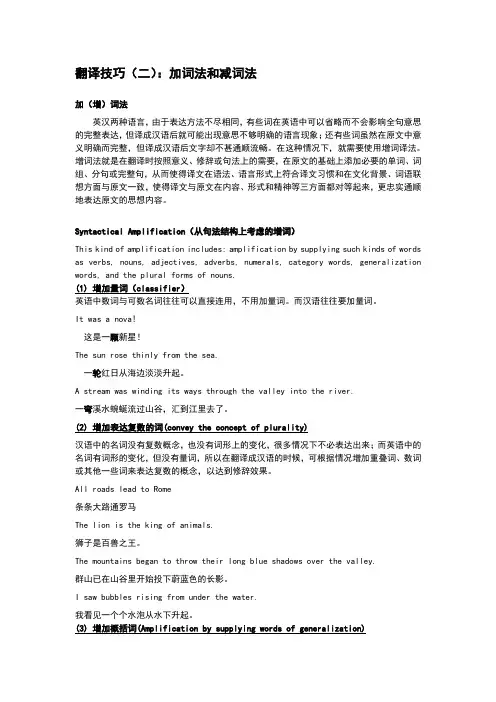
翻译技巧(二):加词法和减词法加(增)词法英汉两种语言,由于表达方法不尽相同,有些词在英语中可以省略而不会影响全句意思的完整表达,但译成汉语后就可能出现意思不够明确的语言现象;还有些词虽然在原文中意义明确而完整,但译成汉语后文字却不甚通顺流畅。
在这种情况下,就需要使用增词译法。
增词法就是在翻译时按照意义、修辞或句法上的需要,在原文的基础上添加必要的单词、词组、分句或完整句,从而使得译文在语法、语言形式上符合译文习惯和在文化背景、词语联想方面与原文一致,使得译文与原文在内容、形式和精神等三方面都对等起来,更忠实通顺地表达原文的思想内容。
S y n t a c t i c a l A m p l i f i c a t i o n(从句法结构上考虑的增词)This kind of amplification includes: amplification by supplying such kinds of words as verbs, nouns, adjectives, adverbs, numerals, category words, generalization words, and the plural forms of nouns.(1) 增加量词(classifier)英语中数词与可数名词往往可以直接连用,不用加量词。
而汉语往往要加量词。
It was a nova!这是一颗新星!The sun rose thinly from the sea.一轮红日从海边淡淡升起。
A stream was winding its ways through the valley into the river.一弯溪水蜿蜒流过山谷,汇到江里去了。
(2) 增加表达复数的词(convey the concept of plurality)汉语中的名词没有复数概念,也没有词形上的变化,很多情况下不必表达出来;而英语中的名词有词形的变化,但没有量词,所以在翻译成汉语的时候,可根据情况增加重叠词、数词或其他一些词来表达复数的概念,以达到修辞效果。
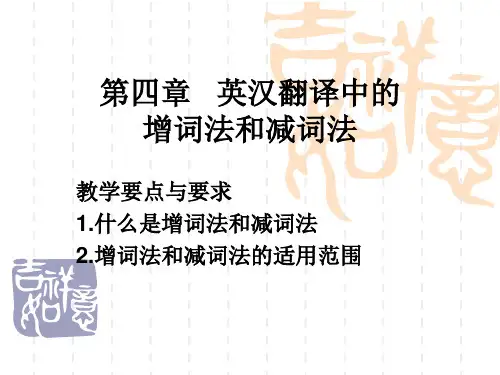
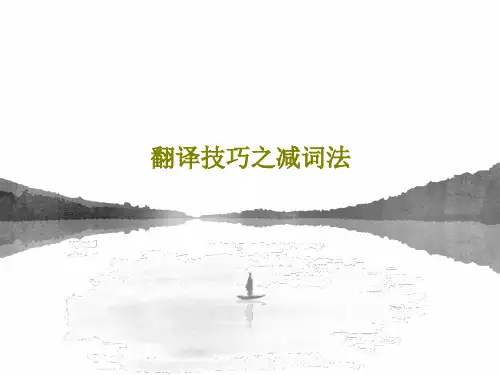
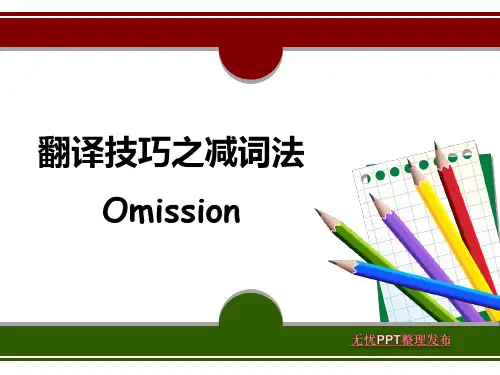
❝翻译方法和技巧(六)❝英汉互译中的增词法和减词法❝根据上下文的意思,逻辑关系,句法特点和表达习惯增加原文中没有出现但是实际包含的词,或者减少原文中虽出现但译文表达用不着的词。
❝翻译的增词法和减词法是一个事物的互为补充的两个方面,如果汉译英要加词,那么英译汉就要减词。
❝一、增词法-增词不增意❝增词法:這種方式多半用在漢译英里。
漢語無主句較多,而英語句子一般都要有语法主語,所以在翻譯汉語无主句的時候,除了少數可用英語无主句、被動語态或”There be…”結构來翻譯以外,一般都要根语語境補出主語,使句子完整。
❝英漢兩種語言在名詞、代詞、連詞、介詞和冠詞的使用方法上也存在很大差別。
例如,英語中代詞使用頻率較高,凡說到人的器官和歸某人所有的或與某人有关的事物時,必須在前面加上物主代詞。
因此,在漢譯英時需要增補物主代詞,而在英譯漢時又需要根據情況這當地刪減。
❝英語詞与詞、詞組与詞組以及句子与句子的逻辑关系一般用連詞來表示,而漢語則往往通過上下文和語序來表示這種关系。
因此,在漢譯英時常常需要增補連詞。
❝你来我就走❝I will leave if/as you come.❝ 1.英汉互译中最常见的增减词就是范畴词(方面、方式、问题、程度、情况之类的词)❝在下个世纪,很多国家将出现技术匮乏现象。
❝There will be a skill shortage in many countries in the next century.❝许多人主张采取强有力的措施镇压走私活动❝Many advocated strong action to crack down the smuggling.❝ 2.原文中一些不言而明需要根据上下文的情况和用法加上去。
❝You were, you are, and you remain to be the consumers of our products.❝你们永远是我的客户。
❝你们过去是,现在是,将来仍然是我们的客户。
第7课翻译技巧--减词减词是指将原文中需要、而译文中又不需要的词语省去。
减省的词语应是那些在译文中保留下来反而使行文累赘噜嗦、且不合汉语语言表达习惯的词语。
减词一般用于以下两种情况:一是从语法角度进行减省;二是从修饰角度进行减省。
一、从语法角度进行减省英汉两种语言在语法上差异较大,例如:英语有冠词,而汉语却没有;英语重形合、连接词较多,汉语重意合、连接词较少;英语中介词丰富,多达280多个,汉语中介词则较少,只有30来个;英语中经常使用代词,尤其是经常使用人称代词、关系代词等,而汉语翻译中代词则用得较少,日文翻译则用的较多;因此,英译汉时可根据具体情况将冠词、连接词、介词、代词略去,使译文练达晓畅。
例如:(1) I know my friends from the feel of their faces.我靠触摸脸庞来辨认朋友。
(2) Ice is a solid. If we heat it, it melts and becomes water.冰是固体,如果加热,就融化成水。
(3) John got up very early in the morning. He put on his jacket, sat down at his desk and began to do his homework.约翰早晨起床很早,他穿上夹克,就坐在桌旁开始做家庭作业。
(4) But at the present moment the whole road looked rather pretty, for the sun had just set in splendor, and the equalities of rent were drowned in a saffron afterglow.但此时整条路看起来都挺美,金灿灿的太阳刚落下山,橙红色的余辉掩盖了房屋的种种差异。
(5) He had a shelf there, where he kept his Bohemian papers and his pipes and tobacco, and his shears and needles and thread and tailor's thimble.他放在那儿有一个架子,摆着他的波希米亚报纸、烟斗、烟叶,还有大剪刀、针、线,以及裁缝用的顶针。
英语翻译之减词法减词法(。
m映ion)是指原义个有些问在译文中不必环出来,这是因为:英汉两种语言的表达方式和习惯不向,原义小虽有其向,性在译文巾却无其意,Jd此,翻译时可以省略不泽;什忠于原义内容的前提下,为使译文简练、叨丁、通顺、自然,jIf以省略原文巾的某些词而不译。
语法家奈斯菲尔德(队s6N)说:“概言之,一句之中简洁所生之力*与繁芜所耗之力.正负相若c无益之宁,必然有害,”罗马政治家、作家西寒罗(酗ceM)曾说:“我并没个将那些作航逐字翻译,而只是保存那种语文的风格和力量。
”(1(Jid not transla[e them wonlfoT Wrd? b毗I prese财cdthe xenc贝1sLyle antlfl爪?ofthelu”别“Be.)罗马诗人赫世斯(Ho她,·?!)也主张活译,他说:“即使你逐字翻译,也不能算是忠实的译者。
”(Nor Wm you阳a faitMultM53a20r比nder word.) 总之,减词就是减去那些不必译出来的同,译文小虽尤其向而有其意义。
减词法可概括为语法减词和求其句子简治明了而减词两方面。
语法减词主要是省掉冠词词。
例如:“A hook i5uBefuL书是有用的。
“扎e e劝h i3川uHd.地球是圆的。
The th舱e thinS5mod dimcuLt毗b keeP a sec比laH inJuTy抓d b maLG Lood u日l(Ifleisu吁.三件最难的事是:守密、忘嫌和充分利用空闲。
以上各译例均为省掉冠词。
n wa6not un[U the么dGe毗h ce毗ury tk城60meone[hough[the舱mightbe a ci腻ul凹movemen[of blnod b6twGen the h60nand the lun8L 巩e movGmG财t)f t11G h1(Kxl肥mainctI 口eg口以深圳翻译公司mys[ery As 5n dlguod my6te叮storlls,the比a阳P1enty ofsixn6tk出poi毗比the血th.b 皿1t took a clever m肌to wor o皿Lhe韶1atiDH9hip be切een dhem and 5nd the an5Wer Thd 2n凹wax wHHaln HoWGY白到十六世纪,才有人认为心肺之间也许存在一种血液的循环运动。
翻译技巧由于汉英两种语言在词法、句法上的差异,翻译并不是简单的一对一复制,而是根据具体情况,灵活地运用翻译技巧坐车必要的调整和改变,使译文最大程度地再现原文的意义,又使它符合译语的表达习惯。
翻译技巧大体分为八类。
它们是:加注(annotation)、释义(paraphrase)、增词(amplification)、减词(omission)、转换(shift of perspective)、归化(adaptation)、切分(division)和合并(combination)。
1.加注由于汉英文化的不同,英语中某些词义在汉语中根本不存在,形成词义上的空缺。
在这种情况下,常常采用加注法来弥补空缺。
加注可分为音译加注和直译加注两种。
音译加注指音译后附加解释性注释。
注释可长可短,可以在文中注释,也可采用脚注。
Cartoon 卡通片Hamburger 汉堡包Benz 奔驰车Hippie 嬉皮士(20世纪60年代出现在美国的青年颓废派一员,喜群居,蓄长发,穿奇装异服)El Nino 厄尔尼诺(现象)(指严重影响全球气候的太平洋热带海域的大风及海水的大规模移动)Saint Valentine’s Day 圣瓦伦丁节情人节,2月14日)1.Hygeia herself would have fallen sick under such aregiment; and how much more this poor old nervous victim?按照这样的养生之道,别说这可怜的老太太了,就连健康女神哈奇亚本人也会生病。
2.You look like Al-Capone in that suit.你穿上那套衣服,看上去就像个流氓阿尔·卡彭。
3.He saw himself, in a smart suit, bowed into theopulent suites of Ritzes.他发现自己身着漂亮的礼服,被恭恭敬敬地引进了像里兹饭店一般的豪华旅馆的客房里下榻。
翻译技减词2007-8-29【大中小】【打印】【我要纠错】减词是指将原文中需要、而译文中又不需要的词语省去。
减省的词语应是那些在译文中保留下来反而使行文累赘噜嗦、且不合汉语语言表达习惯的词语。
减词一般用于以下两种情况:一是从语法角度进行减省;二是从修饰角度进行减省。
一、从语法角度进行减省英汉两种语言在语法上差异较大,例如:英语有冠词,而汉语却没有;英语重形合、连接词较多,汉语重意合、连接词较少;英语中介词丰富,多达280多个,汉语中介词则较少,只有30来个;英语中经常使用代词,尤其是经常使用人称代词、关系代词等,而汉语中代词则用得较少;因此,英译汉时可根据具体情况将冠词、连接词、介词、代词略去,使译文练达晓畅。
例如:(1)I know my friends from the feel of their faces.我靠触摸脸庞来辨认朋友。
(2)Ice is a solid. If we heat it, it melts and becomes water.冰是固体,如果加热,就融化成水。
(3)John got up very early in the morning. He put on his jacket, sat down at his desk and began to do his homework.约翰早晨起床很早,他穿上夹克,就坐在桌旁开始做家庭作业。
(4)But at the present moment the whole road looked rather pretty, for the sun had just set in splendor, and the equalities of rent were drowned in a saffron afterglow.但此时整条路看起来都挺美,金灿灿的太阳刚落下山,橙红色的余辉掩盖了房屋的种种差异。
(5)He had a shelf there, where he kept his Bohemian papers and his pipes and tobacco, and his shears and needles and thread and tailor's thimble.他放在那儿有一个架子,摆着他的波希米亚报纸、烟斗、烟叶,还有大剪刀、针、线,以及裁缝用的顶针。
(6)Most of the people who appear most often and most gloriously in the history books are great conquerors and generals and soldiers…史书上最经常出现、最为显赫的人物,大多是些伟大的征服者、将军和军事家。
(7)The city has a dense manufacturing population.这个城市有稠密的工业人口。
(8)The products should be sampled to check their quality before they leave the factory.产品出厂前应该进行抽样检查。
(9)The mother and the eldest daughter weeded the ridges, passing before the others…A younger son, of twelve years, brought sea sand in a donkey's creels from a far corner of the field. They mixed the sand with the black clay. The fourth child, still almost an infant, staggered about near his mother, plucking weeds slowly and offering them to his mother as gifts.母亲和大女儿在除垄上的草,把旁人甩在后面……二儿子十二岁,从老远的地头把海滩上的沙子装进鱼篮,赶着毛驴驮了回来。
他们把黑土掺上了沙子。
老四还是个小不点儿,在母亲身边遥遥晃晃转悠着,慢吞吞地拔起杂草,当礼物送给母亲。
(10)Come if you like.高兴来就来。
(11)As it is late, let us go to bed.不早啦,睡吧!(12)I framed the words in my mind: "Pardon me, but have I done something to offend you?"我心里在嘀咕:"对不起,我有什么举止行为冒犯你了吗?"(13). You hear it from the trackers, a more breathless chant, as they pull desperately against the current, half a dozen of them perhaps if they are, taking up a wupan, a couple of hundred if they are hauling a splendid junk, its square sail set, over a rapid.纤夫拼命拉纤逆流而上时,你就会听见他们唱着较急促的号子。
拉五板木船时,或许五六人就行,但当拉着鼓着横帆的大船过急滩时,那就得要二三百人。
(14). If you are a twinkler, you have the ability to walk into a room and bring the sunshine with you, making everyone else want to bask in it.满怀喜悦的人能把阳光带进他所走进的房间,使别人愿意沐浴在这阳光中.二、从修饰角度进行减省有些词语在英语里是必不可少的,但在汉语中却并非如此,如直译成汉语则往往显得累赘噜嗦。
为了使译文简洁晓畅、"文约而意丰",这样的词语必须省去或是精简。
例如:(1)I felt a trifle shy at the thought of presenting myself to a total stranger with the announcement that I was going to sleep under his roof, eat his food and drink his whisky, till another boat came in to take me to the port for which I was bound.我要去见一个素不相识的陌生人,向他宣布我得住在他家、吃他的、喝他的,一直等到下一班船到来,把我带到我要去的港口为止──想到这儿,我真有点不好意思了。
(这里,如把"sleep under his roof, eat his food and drink his whisky"直译为"睡在他的屋顶下、吃他的食物、喝他的威士忌",会使语言极为繁冗,不够精练。
译文采用减省译法处理原文,既准确地传达了原意,又使行文简洁,气韵十足,一气呵成。
)(2)Her dark eyes made little reflected stars. She was looking at him as she was always looking at him when he awakened.她那双乌黑的眼睛就像亮晶晶的星星在闪烁,他平素醒来的时候,她也是这样望着他。
(此句中有两个"she was looking at him",如不作省略而译为"她像平常那样望着她一样望着他",汉语就显得噜嗦繁复,诘屈聱牙。
)(3)University applicants who had worked at a job would receive preference over those who had not.报考大学的人,有工作经验的优先录取。
(4)There was no snow, the leaves were gone from the trees, the grass was dead.天未下雪,但叶落草枯。
(5)There was not a sound in her——and around us nothing moved, nothing lived, not a canoe on the water, not a bird in the air, not a cloud in the sky.船上悄然无声,四周一片静谧,死一般沉寂,水面不见轻舟飘动,天空不见小鸟浮云。
(6)The problem of alternative fuels of vehicle is one problem we shall approach.车辆的代用燃料是我们将要研究的一个问题。
(7)There are some things that I have happily seen of the wondrous way of the spider.蜘蛛的奇异动态,我曾有幸目睹。
(译文省去"there are some things that"后,文字简约,表达生动,意思明确。
)(8)In actual fact, the United States is pursuing a policy of encouraging the aggressor…实际上,美国在推行一种鼓励侵略者的政策……(9)He was smooth and agreeable.他待人处事,八面玲珑。
(10)Standing as it does on a high hill, the church commands a new view.教堂建在高山上,向下眺望,风景优美。
(11)To learn is not an easy matter and to apply what one has learned is even harder. 学习不容易,使用更加不容易。